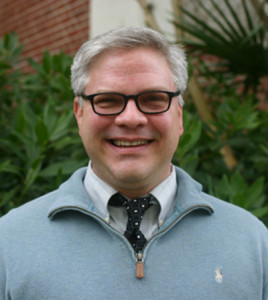
George Baker
George Baker, an assistant professor in the department of Food Science and Human Nutrition at the University of Florida, has been named the Florida Sea Grant seafood science and technology specialist within UF/IFAS Extension. Baker brings a strong background in food safety analysis to the position, and will work closely with the seafood industry and regulatory agencies to ensure the sustainability, safety, diversity and quality of Florida seafood products.
“I’m very excited to be a part Florida Sea Grant,” Baker said, “and I sincerely hope to continue the long-standing history of industry collaboration the program has provided in the area of seafood safety and quality.
“The Florida seafood industry will continue to face new safety, quality and regulatory issues, especially with the implementation of the Food Safety Modernization Act. I’ll continue to build relationships with companies that supply, purchase and prepare seafood, determine what issues they may be facing and work to solve them.”
Baker holds a bachelor’s degree in agriculture from the University of Florida, and a Ph.D. in food science specializing in food analysis and sensory evaluation of food, also from UF. He joined the university’s food science faculty in 2009.
He has several years of experience in the private sector working for ABC Research Corporation, an independent food safety laboratory located in Gainesville. While there, he assisted businesses and organizations with determining ways they could provide high-quality foods to their customers, and with understanding new food-safety regulations. He developed a testing protocol for the Aquaculture Certification Council that analyzed farmed seafood for microbes and contaminants. He also helped shrimp aquaculture companies develop internal and external testing protocols for food safety and quality, and worked with state regulatory agencies in Louisiana to establish methods that test for banned antibiotic residues in imported seafood.
“The positions I held at ABC provided me the outlet to interact and develop relationships with literally hundreds of people and organizations ranging from small, family-owned companies to the biggest food and beverage producers in the world,” Baker said.
In 2007, he was named the Laboratorian of the Year by the Florida Association for Food Protection, a recognition of outstanding commitment in using and developing innovative and practical laboratory techniques to support food safety. Baker has also lectured on detection of contaminants in imported shrimp at the University of Florida’s Shrimp School, the leading academically-based domestic and international training program for shrimp processors and regulators worldwide.
“Seafood safety has seemingly always been a major issue for consumers. If certain safeguards are taken, even raw and minimally cooked seafood is considered safe for the majority of people,” Baker said. “There are food processing technologies that we plan to explore that may further decrease certain risks associated with seafood consumption or might improve product shelf-life.”



